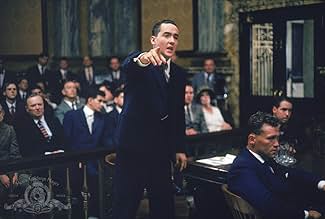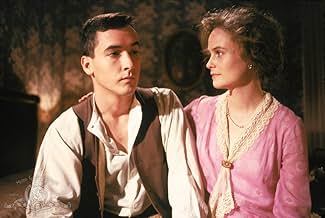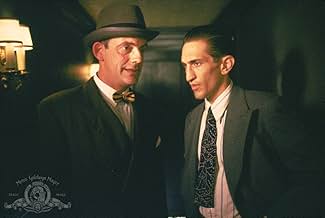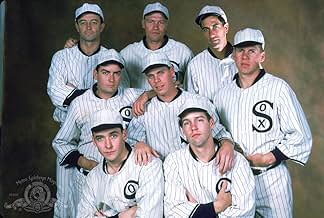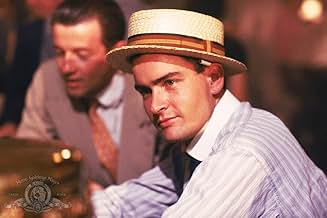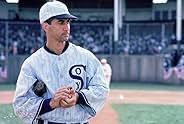A dramatization of the Black Sox scandal when the underpaid Chicago White Sox accepted bribes to deliberately lose the 1919 World Series.A dramatization of the Black Sox scandal when the underpaid Chicago White Sox accepted bribes to deliberately lose the 1919 World Series.A dramatization of the Black Sox scandal when the underpaid Chicago White Sox accepted bribes to deliberately lose the 1919 World Series.
- Awards
- 2 nominations total
James Desmond
- Smitty - The Writers
- (as Jim Desmond)
- Director
- Writers
- All cast & crew
- Production, box office & more at IMDbPro
Featured reviews
10llltdesq
This is probably the best film to be completely ignored by every major award in film in the last 25 years. For all that its about baseball players, it is NOT a baseball movie. The Black Sox scandal and its effect on baseball transcended baseball. The ensemble cast does a marvelous job, particularly Straithairn and Sweeney, who plays "Shoeless" Joe Jackson, one of the more tragic figures of the whole mess. In spite of taking money to throw the Series, Jackson went out and batted .375 for the Series. The Chicago payers in on the payoff (and one poor soul who didn't go along, but was approached) were banned from baseball for life. No less an authority than Ted Williams believes Jackson should be in the Hall of Fame. But I digress. The film goes into the motivations of the players, who were playing for a pittance and had no say over where they played. Thus they were perfect targets for the fix in the first place. Excellent and gripping film about human reactions to stress and temptation. Most recommended.
When the team that couldn't be beat threw the World Series in 1919 they did more than deliberately lose a few baseball games; they corrupted the National Pastime and ushered the sport out of its age of innocence. Writer director John Sayles succeeds in showing exactly how and why eight players on the best team in baseball set in motion what had to be one of the most poorly conceived, organized and executed conspiracies in the whole history of graft, and in his usual role as a champion of the working class portrays the guilty players as victims of money-grubbing corporate exploitation (represented both by team management and organized crime).
But it's all the cynical wheeling and dealing behind the Black Sox scandal which make the film so fascinating. The story might have been unbelievable if it wasn't entirely true, but like any aspect of real life the details are messy and inconclusive. Most of the film recounts the mechanics of the fix; events during the subsequent exposure and trial are telescoped too quickly into the final forty minutes or so, which makes sense: in any conspiracy the crime is always more interesting than the punishment.
It helps to be at least slightly familiar with the huge cast of characters involved: players, gamblers, reporters and so forth. A few scenes have been added for dramatic unity, and others were abbreviated to maintain a consistent pace, but all the facts are there, and Sayles manages to pull them all together in an entertaining history lesson from our collective adolescence, re-creating that fateful moment when the boys of summer grew up for good.
But it's all the cynical wheeling and dealing behind the Black Sox scandal which make the film so fascinating. The story might have been unbelievable if it wasn't entirely true, but like any aspect of real life the details are messy and inconclusive. Most of the film recounts the mechanics of the fix; events during the subsequent exposure and trial are telescoped too quickly into the final forty minutes or so, which makes sense: in any conspiracy the crime is always more interesting than the punishment.
It helps to be at least slightly familiar with the huge cast of characters involved: players, gamblers, reporters and so forth. A few scenes have been added for dramatic unity, and others were abbreviated to maintain a consistent pace, but all the facts are there, and Sayles manages to pull them all together in an entertaining history lesson from our collective adolescence, re-creating that fateful moment when the boys of summer grew up for good.
Eight Men Out provides a "Reader's Digest" version of the complicated events surrounding the 1919 World Series.
If you forgive the fact the film has to simplify certain aspects of the conspiracy in order to make the film easier to digest, then you will find that Eight Men Out is a worthy film and in the category of "baseball movies" it's one of the best.
There are anachronisms in the film here and there, the worst of which is Buck Weaver's question asking which of the lawyers was the "Babe Ruth" of law. Sure Babe Ruth was coming into his own by 1920, but most ballplayers in that era would not have place Ruth in the class of Cobb, Tris Speaker or Walter Johnson. For baseball fans, this line in particular really comes off as shallow, especially since the rest of the film really tries to capture the "dead-ball" era. For the most part though, this film feels and sounds a lot like America right after World War I ends, a fascinating time and place.
Studs Terkel steals the show in my estimation. His character in the film is not far from whom he is in real life and his authenticity is undeniable. John Sayles is a little stiff by comparison and his singing in the railway car (which according to legend did actually happen), is rather difficult to bear. None the less, his direction makes up for his foibles as an actor.
Straitharn is another gem in this movie, and once again this actor seems to get right to the soul of the characters he is given to play. Eddie Cicotte's dilemmas are written all over Straitharn's face in every scene, he's also given some of the best dialog in the film. Cusack plays his part well, despite the fact that many of his scenes are reduced to clichés. Cusack's best moments are when he is frustrated about his inclusion in the conspiracy trial, despite the fact he gave his all to try and win the series. His outbursts in the courtroom seem perfect, as if drawn from the trial transcripts themselves.
Joe Jackson is given unfair treatment. If "Field of Dreams" mythologizes Jackson to point of hyperbole, "Eight Men Out" plays up his illiteracy with too much of a heavy hand. Joe Jackson wasn't stupid, indeed if you read his last major interview before he died, he speaks about the "Black Sox" with great alacrity and clarity. He was not as ignorant as this film would have you believe. One day someone will produce a film about Joe Jackson, that will portray him accurately, but Eight Men Out is not that film.
Although their roles are very minor, Kid Gleason and Ray Schalk are really well played and written. These two went through a very difficult time during the series, and this is well demonstrated. One minor beef is that Nemo Leibold, Shano Collins and other players outside of the conspiracy are never touched upon at all. This is understandable to a degree given the relatively short length of the film, despite the complexity of the subject matter.
The baseball scenes themselves are well done. The bats, balls, gloves and uniforms look like the equipment of that era and the ballparks are successful mock ups for the most part. There are even a couple of nifty athletic displays in the outfield that must have taken several takes to pull off.
Overall, this is my second favorite baseball movie, next to "Bull Durham". Its a little light on some of the details of the conspiracy, but it makes up for it in other areas. It has some great music, some great sets, some solid acting and overall seems genuine and fair to all the major players in the conspiracy.
Eight Men Out isn't perfect, but it isn't as flawed as Roger Ebert would have you believe. If you a fan of baseball in fact, I'd say its mandatory viewing.
If you forgive the fact the film has to simplify certain aspects of the conspiracy in order to make the film easier to digest, then you will find that Eight Men Out is a worthy film and in the category of "baseball movies" it's one of the best.
There are anachronisms in the film here and there, the worst of which is Buck Weaver's question asking which of the lawyers was the "Babe Ruth" of law. Sure Babe Ruth was coming into his own by 1920, but most ballplayers in that era would not have place Ruth in the class of Cobb, Tris Speaker or Walter Johnson. For baseball fans, this line in particular really comes off as shallow, especially since the rest of the film really tries to capture the "dead-ball" era. For the most part though, this film feels and sounds a lot like America right after World War I ends, a fascinating time and place.
Studs Terkel steals the show in my estimation. His character in the film is not far from whom he is in real life and his authenticity is undeniable. John Sayles is a little stiff by comparison and his singing in the railway car (which according to legend did actually happen), is rather difficult to bear. None the less, his direction makes up for his foibles as an actor.
Straitharn is another gem in this movie, and once again this actor seems to get right to the soul of the characters he is given to play. Eddie Cicotte's dilemmas are written all over Straitharn's face in every scene, he's also given some of the best dialog in the film. Cusack plays his part well, despite the fact that many of his scenes are reduced to clichés. Cusack's best moments are when he is frustrated about his inclusion in the conspiracy trial, despite the fact he gave his all to try and win the series. His outbursts in the courtroom seem perfect, as if drawn from the trial transcripts themselves.
Joe Jackson is given unfair treatment. If "Field of Dreams" mythologizes Jackson to point of hyperbole, "Eight Men Out" plays up his illiteracy with too much of a heavy hand. Joe Jackson wasn't stupid, indeed if you read his last major interview before he died, he speaks about the "Black Sox" with great alacrity and clarity. He was not as ignorant as this film would have you believe. One day someone will produce a film about Joe Jackson, that will portray him accurately, but Eight Men Out is not that film.
Although their roles are very minor, Kid Gleason and Ray Schalk are really well played and written. These two went through a very difficult time during the series, and this is well demonstrated. One minor beef is that Nemo Leibold, Shano Collins and other players outside of the conspiracy are never touched upon at all. This is understandable to a degree given the relatively short length of the film, despite the complexity of the subject matter.
The baseball scenes themselves are well done. The bats, balls, gloves and uniforms look like the equipment of that era and the ballparks are successful mock ups for the most part. There are even a couple of nifty athletic displays in the outfield that must have taken several takes to pull off.
Overall, this is my second favorite baseball movie, next to "Bull Durham". Its a little light on some of the details of the conspiracy, but it makes up for it in other areas. It has some great music, some great sets, some solid acting and overall seems genuine and fair to all the major players in the conspiracy.
Eight Men Out isn't perfect, but it isn't as flawed as Roger Ebert would have you believe. If you a fan of baseball in fact, I'd say its mandatory viewing.
To this day, baseball has been a huge part of Americana. And nothing has given the sport a black eye like the World Series scandal of 1919. John Sayles presents the historic swindle in "Eight Men Out." A lot of emotions are on display, as the Chicago White Sox players struggle with the moral dilemmas of the love of the game and being role models to the youth of Chicago, or their desperation caused by tight-fisted White Sox owner Charles Comiskey. Back then, many people of Chicago were ready to forgive their hometown heroes. And even now, you can't help but feel sympathy for the wronged players.
Although I generally agree with Roger Ebert's reviews, I just can't understand how he was annoyed enough with this movie to give it a measly two stars. He claims that there wasn't enough exposition. I found everything explained satisfactorily, even for the non-fan or baseball history buff. And it is period-piece film-making at its finest. I cannot imagine a better telling of this story. And the baseball action is excellent. One factual error, though: Bucky Weaver (John Cusack) would never mention Babe Ruth as better (or even comparable) to Cobb, Speaker and Wheat in 1919 or 1920. It shocks me that Sayles kept that line. USA Today heralded "Eight Men Out" as the greatest baseball movie ever, and though there is some fine company, I find it hard to disagree.
Did you know
- TriviaIn many scenes, players toss their gloves down on the field near their positions before they head to the dugout. Until the 1950s, players frequently left their gloves on the field while at bat. Because of the danger of players stepping on or tripping on them, and batted or thrown balls bouncing off them in odd directions, Major League Baseball requested, then demanded, players to take their gloves with them to the dugout. They finally complied after a rule change and fines.
- GoofsShoeless Joe Jackson signs his confession with an "X". Jackson was illiterate, but he could sign his name by mimicking a pattern. Autographed baseballs and photographs from the time prove it.
- Quotes
[about their opponents]
1st Cincinnati Reds Player: These guys don't look so tough.
2nd Cincinnati Reds Player: Yeah, that's what Custer said when the Indians took the field.
- Crazy creditsThe opening credits are done against a cloudy blue sky, first going up, then to the right, and down to the bottom (kind of like a fly ball). Despite the ensemble cast, the most well-known leading and character actors at the time are credited first in alphabetical order, then lesser known actors that had roles that were just as large or larger are credited in pairs of two. Example: John Cusack, Christopher Lloyd, and Charlie Sheen are credited first, due to their successes with The Sure Thing (1985), Back to the Future (1985), and Platoon (1986), respectively; however, in pairs, Michael Rooker, Kevin Tighe, and Richard Edson also had pivotal roles, but were lesser known. Sheen already was well-established but had only a few minutes of screen time in the movie, Lloyd and Edson always are together, playing gamblers, but Lloyd was a much more well-known actor and credited first.
- Alternate versionsFive seconds were cut from the British theatrical release in order to obtain a "PG" rating by removing a use of strong language. The film was later released uncut on video and the rating was upgraded to "15", which was subsequently downgraded to "12" for the DVD.
- SoundtracksI'm Forever Blowing Bubbles
Written by Jaan Kenbrovin (as Jann Kenbrovin) and John W. Kellette (as John William Kellette)
Published by Warner Bros. Music, a division of Warner Bros. Inc.
Used by permission. All rights reserved.
- How long is Eight Men Out?Powered by Alexa
Details
Box office
- Budget
- $6,100,000 (estimated)
- Gross US & Canada
- $5,680,515
- Opening weekend US & Canada
- $1,129,491
- Sep 5, 1988
- Gross worldwide
- $5,680,515
Contribute to this page
Suggest an edit or add missing content




